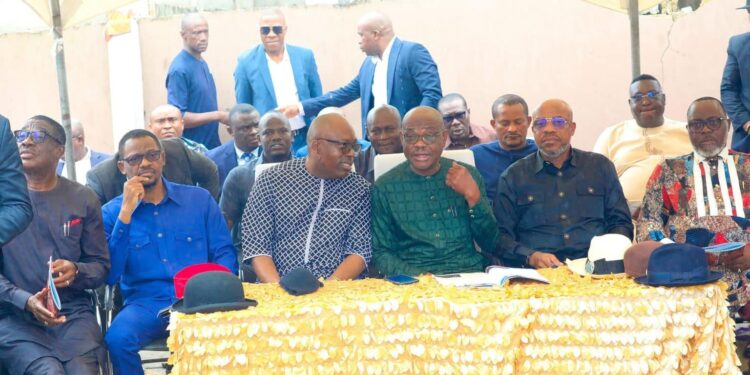Suspended Rivers State Governor Siminalayi Fubara, FCT Minister Nyesom Wike, and suspended Assembly Speaker Martin Amaewhule have appeared together publicly for the first time since President Bola Tinubu brokered a peace agreement to end their prolonged political feud.
The trio attended the burial ceremony of Wike’s uncle in Rumuepirikom, the FCT Minister’s hometown in Obio/Akpor Local Government Area, marking a symbolic moment of reconciliation just two days after the presidential intervention at Aso Villa.
The joint appearance represents a significant development in Rivers State politics, where the three key figures had been embroiled in a bitter political crisis for nearly two years. Their conflict had paralyzed governance in the oil-rich state and prompted concerns about democratic stability in the Niger Delta region.
The funeral service attracted prominent political stakeholders from across the South-South region, including Senators Allwell Onyesoh, George Thompson Sekibo, and Olaka Nwogu. Other notable attendees included former Deputy Speaker of the House of Representatives Chibudom Nwuche, former House of Representatives member Ken Chikere, and South-South Vice Chairman of the APC Victor Giadom.
Dr. Sam Sam Jaja, former PDP Deputy National Chairman, was also present among other political heavyweights who witnessed this rare display of unity among the previously warring parties. The gathering provided a platform for informal interactions that could further cement the peace process initiated by President Tinubu.
While no official political statements were made during the solemn occasion, the symbolic presence of all three protagonists in one location has sparked renewed optimism about the resolution of the Rivers crisis. Political observers view their attendance at the same event as a positive sign that the animosity that had defined their relationships may be giving way to cooperation.
The political crisis had reached such alarming proportions that a state of emergency was declared three months ago, raising fears about the breakdown of democratic governance in one of Nigeria’s most economically important states. The conflict had created parallel government structures and threatened the stability of institutions in Rivers State.
Thursday’s peace meeting at the Presidential Villa reportedly resulted in a comprehensive agreement that addresses the core issues driving the conflict, including power-sharing arrangements and the status of suspended lawmakers. The terms of the deal have not been fully disclosed, but sources suggest significant concessions were made by all parties.
The appearance of Fubara, Wike, and Amaewhule together at a family event demonstrates their willingness to honor the spirit of reconciliation beyond formal political agreements. Such personal interactions often prove crucial in sustaining peace deals that might otherwise remain fragile without genuine relationship rebuilding.
Political analysts suggest that the success of the Rivers peace process could serve as a model for resolving similar political crises in other states where godfathers and their proteges have fallen out. The federal government’s intervention has been praised for preventing potential violence and institutional collapse.
The Rivers reconciliation also holds broader implications for the All Progressives Congress and Peoples Democratic Party, as both parties have significant interests in maintaining stability in the strategically important state ahead of future electoral cycles.



















